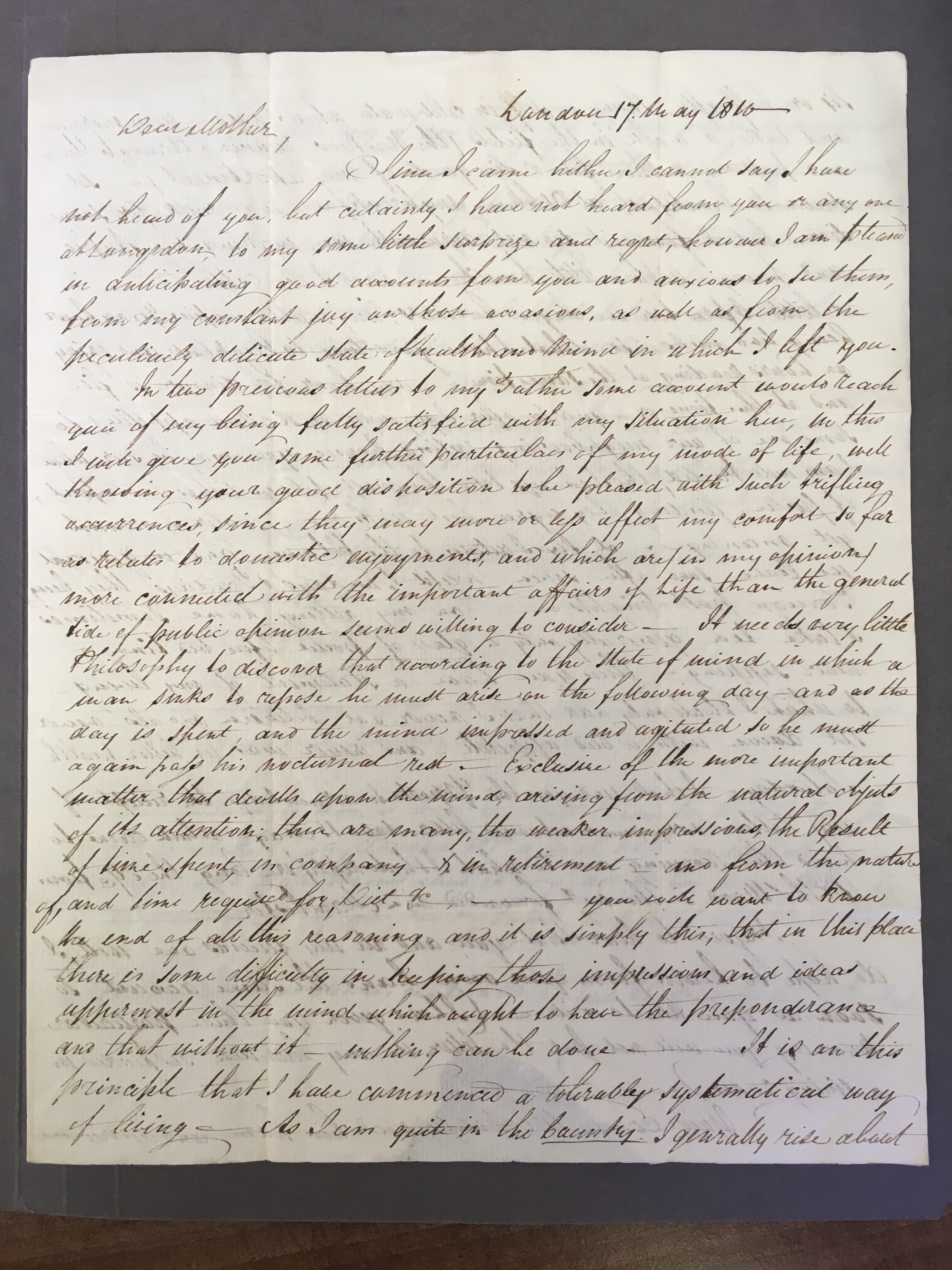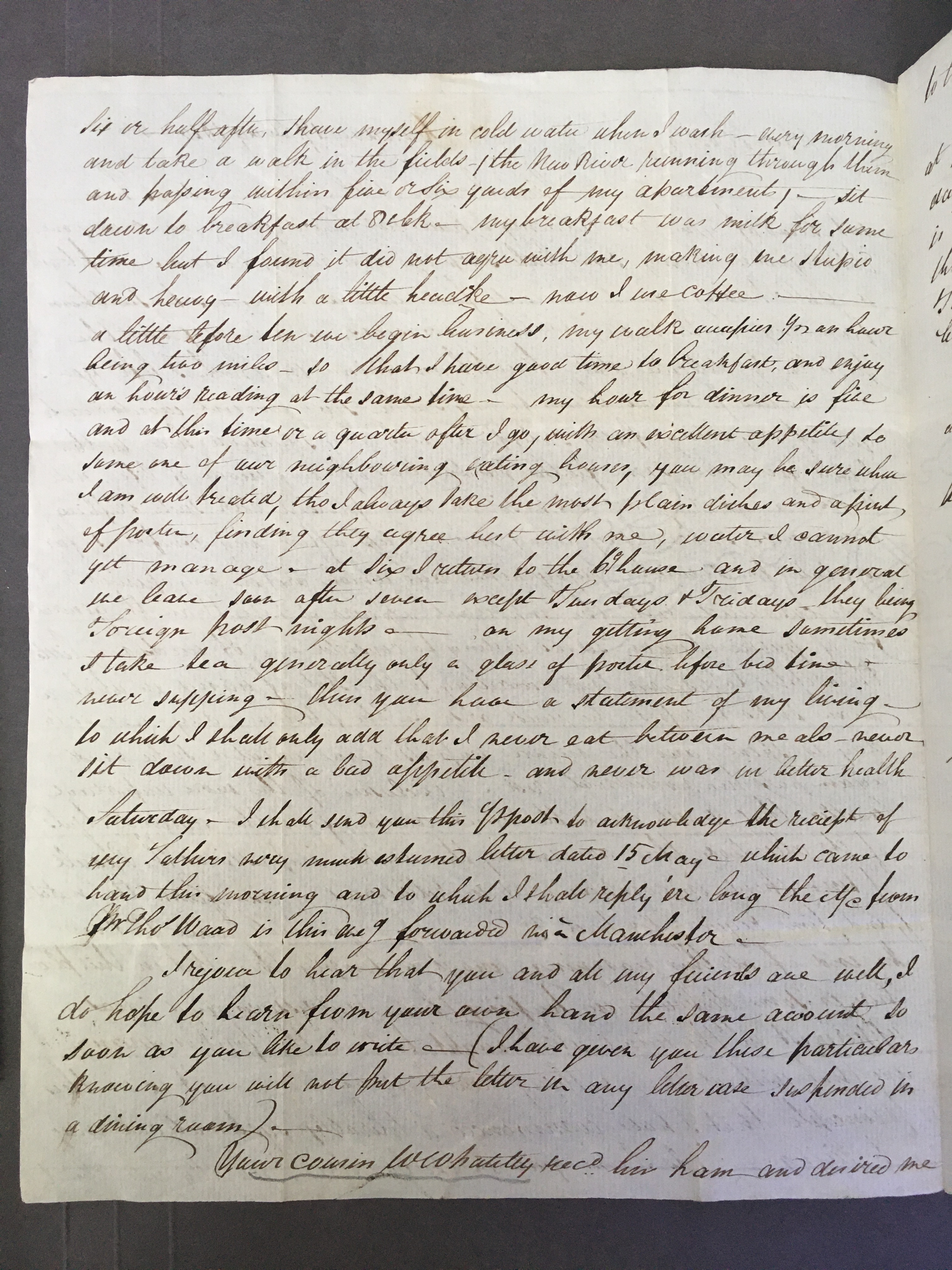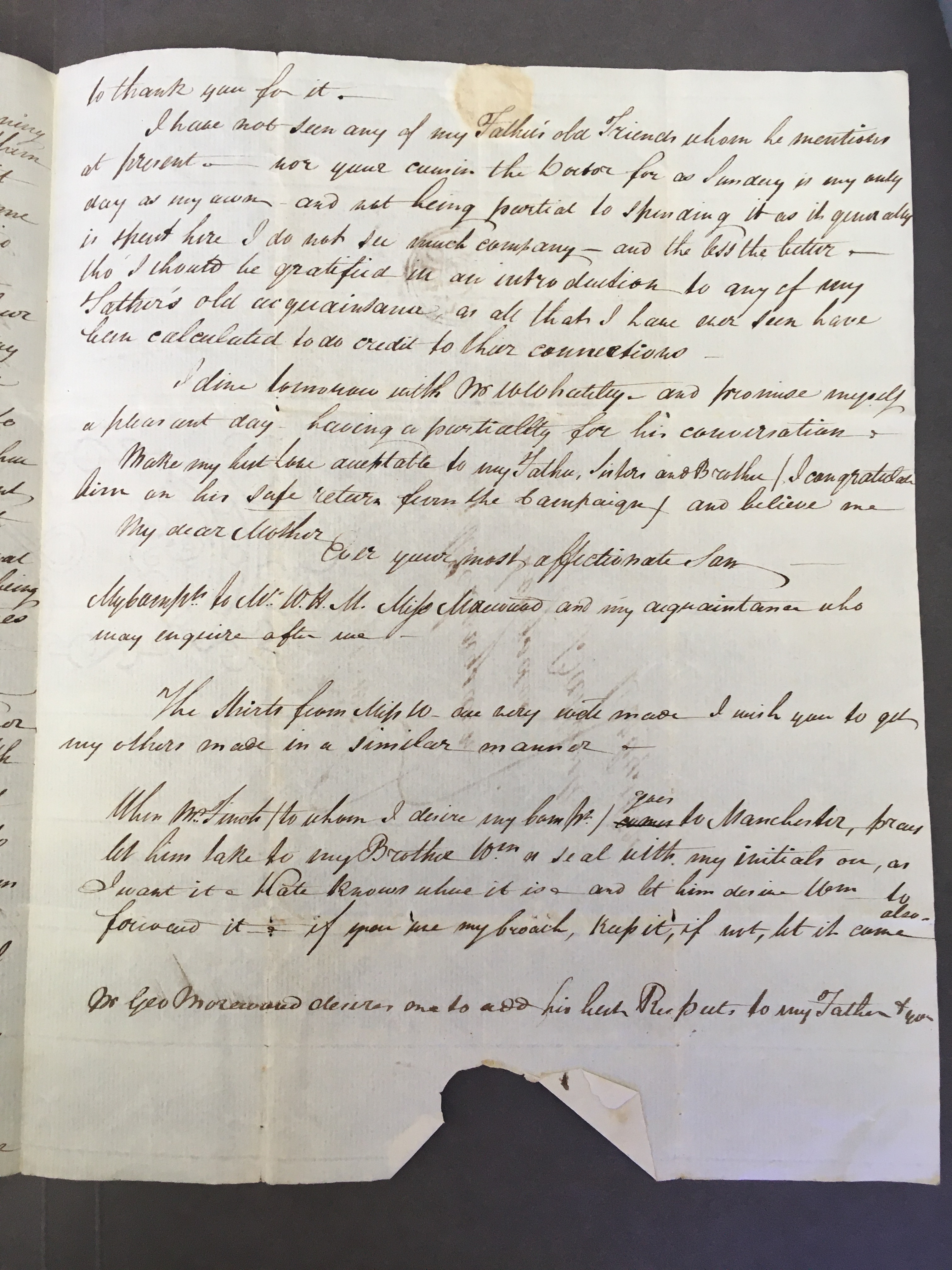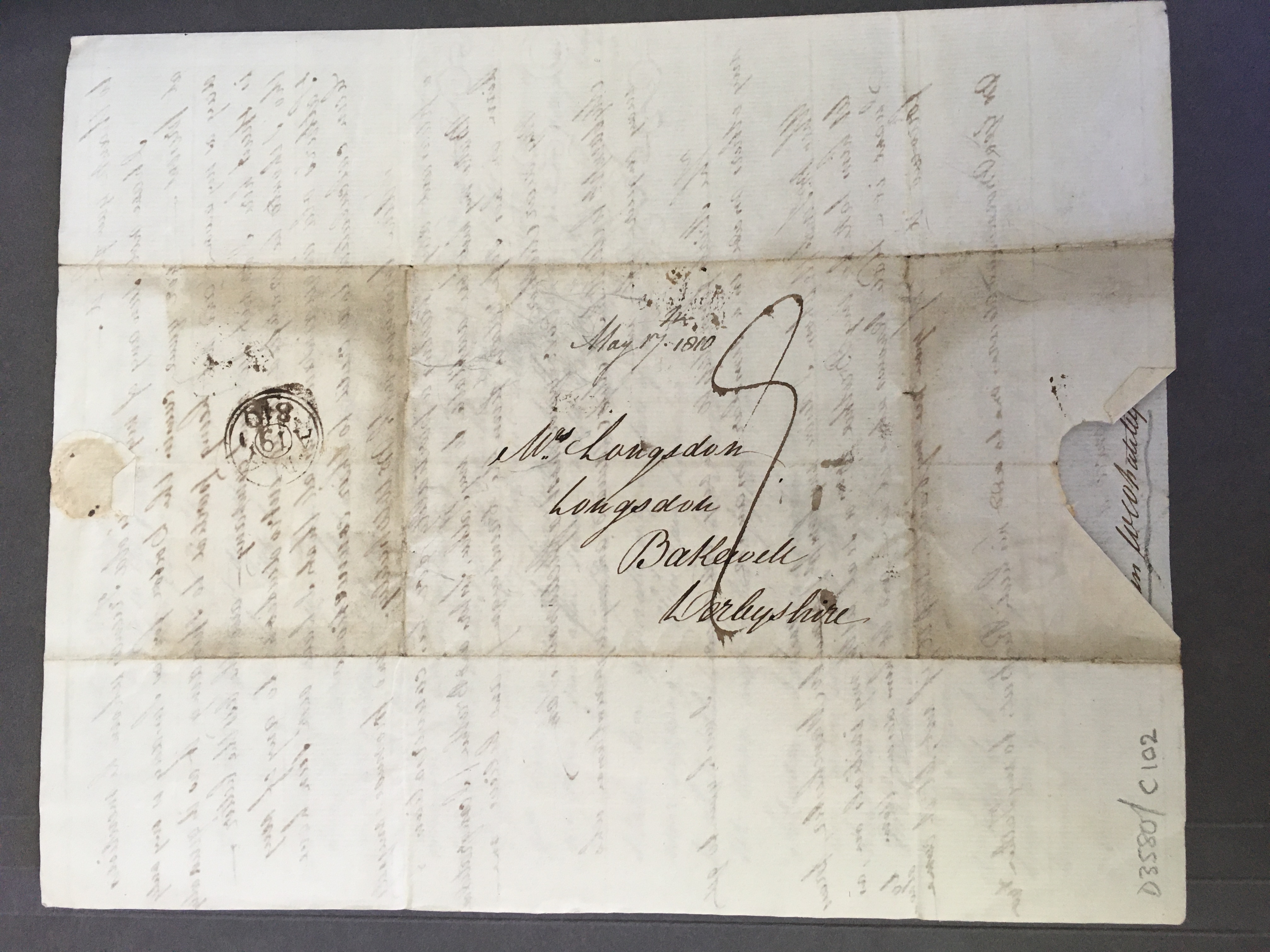2190 - John Longsdon to Elizabeth Longsdon (snr), 17 May 1810
- Transcription
- Letter Details
- People (2)
- How to Cite
Image 1 of 4

Image 2 of 4

Image 3 of 4

Image 4 of 4

Image 1
London 17 May 1810
Dear Mother,
Since I came hither I cannot say I have
not heard of you, but certainly I have not heard from you or any one
at Longsdon, to my some little surprize and regret, however I am pleased
in anticipating good accounts from you and anxious to see them,
from my constant joy on those occasions, as well from the
peculiarly delicate state of health and mind in which I left you.
In two previous letter to my Father some account would reach
you of my being fully satisfied with my situation here, in this
I will give you some further particulars of my mode of life, well
knowing your good disposition to be pleased with such trifling
occurrences, since they may more or less affect my comfort so far
as relates to domestic enjoyments, and which are (in my opinion)
more connected with the important affairs of Life than the general
side of public opinion seems willing to consider - It needs very little
Philosophy to discover that according to the state of mind in which a
man seeks to repose he must arise on the following day - and as the
day is spent, and the mind impressed and agitated so he must
again pass his nocturnal rest. Exclusive of the more important
matter that dwells upon the mind, arising from the natural objects
of its attention; there are many, tho weaker impressions, the Result
of time spent, in company, & in Retirement - and from the nature
of, and time required for, Vizt &c - you will want to know
the end of all this reasoning, and it is simply this, that in this place
there is some difficulty in keeping those impressions and ideas
uppermost in the mind which ought to have the preponderance
and that without it - nothing can be done - It is on this
principle that I have commenced a tolerably systematical way
of living - As I am quite in the Country I generally rise about
Image 2
six or half after, shave myself in cold water when I wash - every morning
and take a walk in the fields (the new River running through them
and passing within five or six yards of my apartments) - sit
down to breakfast at 8 clk - my breakfast was milk for some
time but I found it did not agree with me, making me stupid
and heavy with a little headke - now I use coffee
A little before ten we begin business, my walk occupies for an hour
being two miles - so that I have good time to breakfast, and enjoy
an hours reading at the same time - my house for dinner is five
and at this time or a quarter after I go, with an excellent appetite, to
some one of our neighbouring eating houses, you may be sure where
I am well treated, tho I always take the most plain dishes and a pint
of porter, finding they agree but with me, water I cannot
yet manage, at six I return to the C House and in general
we leave soon after seven except Thursdays & Fridays they being
Foreign post nights - on my getting home sometimes
I take tea generally only a glass of porter before bed time
near supping - then you have a statement of my living
to which I shall only add that I never eat between meals - never
sit down with a bad appetite - and never was in better health
Saturday - I shall send you this Ppost to acknowledge the receipt of
my Fathers very much returned letter dated 15 May which came to
hand this morning and to which I shall reply 'ere long the {?Mc} from
Mr Tho Waad is this tho I forwarded via Manchester
I rejoice to hear that you and all my friends are well, I
do hope to hear from your own hand the same account so
soon as you like to write (I have given you these particular
knowing you will not put the letter case suspended in
a dining room)
Your cousin W. Whately recd his ham and desired me
Image 3
to thank you for it.
I have not seen any of my Father's old Friends whom he mentions
at present - nor your cousin the Doctor for as Sunday is my only
day as my own and not being partial to spending it as it generally
is that here I do not see much company - and the less the better -
tho I should be gratified in an introduction to any of my
Father's old acquaintance as all that I have ever seen have
been calculated to do credit to their connections
I dine tomorrow with Mr W Whately and promise myself
a pleasant day having a partiality for his conversation
Make my best love acceptable to my Father, Sister and Brother (I congratulate
him on his safe return from the Campaign) and believe me
my dear Mother
Ever your most affectionate Son
My Compts to Mr W.H. M. Miss {?Marread} and my acquaintance who
may inquire after me
The shirts from Miss W are very well made I wish you to get
any other made in a similar manner
When Mr Finch (to whom I desire my Compts) {^goes} comes to Manchester, pray
let him take to my Brother Wm a seal with my initials on, as
I want it Hale knows where it is and let him desire them to
forward it - if you see my broach, keep it, if not, let it come {^also}
Mr Geo Morewood desires me to add his best Respect to my Father & you
Image 4
14
May 17 1810
Mrs Longsdon
Longsdon
Bakewell
Derbyshire
John Longsdon to Elizabeth Longsdon (snr), 17 May 1810
John is anxious as he has received no news from Longsdon and had left his mother in a ‘peculiarly delicate state of health and mind’. He gives an account of his daily routine including rising, a detailed discussion of meals and their effect on his health, exercise and a quiet life on Sunday. He adds a note saying he is pleased with the shirts from Miss W and wants others made in the same manner.
Longsdon family
D3580/C/102
Derbyshire Record Office
1810
5
17
17 May 1810
London [England]
Longsdon, Bakewell, Derbyshire [England]
primary addressee
consumption
- unwell
- weak
- disposition
- mind
- virtuous
- filial
- motherhood
primary author
head
- bathing
- dining
- dressing
- drinking
- eating
- sleeping
- talking
- visiting
- walking
- work
- aesthetics
- clothing
separation
- health
- well
- happy
- love (familial)
- regret
- worried
- mind
- slow of mind
pain
rest
filial
To Cite this Letter
John Longsdon to Elizabeth Longsdon (snr), 17 May 1810, 1751810: Derbyshire Record Office, Longsdon family, D3580/C/102
To Cite this Edition
Material Identities, Social Bodies: Embodiment in British Letters c.1680-1820. Compiled by: Karen Harvey, Helen Esfandiary, Sarah Fox, Emily Vine, University of Birmingham. Project funded by the Leverhulme Trust (2021-2025, Ref. RPG-2020-163), https://socialbodies.bham.ac.uk.